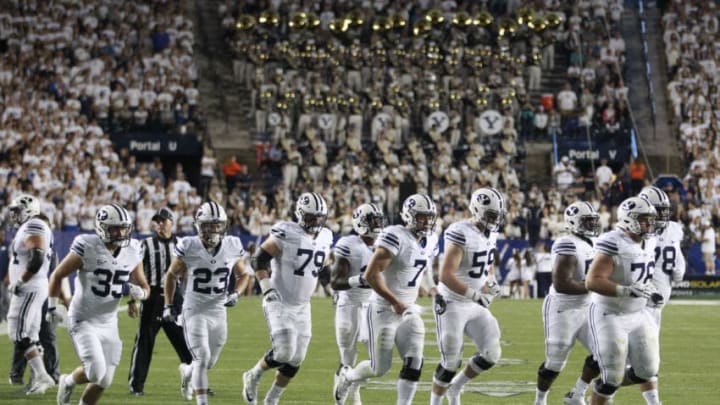A few days ago, LSU coach Ed Orgeron made a comment on twitter about the age of BYU football players. He alluded to this being an advantage for the Cougars.
When he said it, he had no idea of the can of worms he had popped open. Thousands of returned missionaries smirked in unison, as they read the words of this old familiar tale.
It happens far too often. When BYU football is winning, age comes into play.
Maybe the best way to approach this notion is to look at an example. Here’s my story:
I, like many LDS athletes, chose to serve a mission. Unfortunately, I was not sent to the “Gold’s Gym” mission that coach Kalani Sitake joked about during last year’s NCAA title game.
In the spring of 1997, I arrived in Mexico. I left the Ricks College football team after my freshman season, as a 6-foot-4, 265-pound defensive lineman. I ran a 4.9-second 40-yard dash and was in the best shape of my life.
It was quickly derived that conditions were not favorable for maintaining proper athletic shape. With temperatures routinely hitting 100+ degrees and walking 10-15 miles daily, the calories were burning like a bonfire.
We had a large mid-day meal with local families, but finding time to prepare or even eat the other two was a real task. In my attempt to keep muscle mass, a couple of cinder blocks were all that could be found for weight training.
In the next four months, I would lose 90 pounds.
During the last few months of this two year mission, temperatures dropped (high 50’s/low 60’s) because the winter season. This, along with three hard-boiled eggs for breakfast and a small dinner every day, helped me put on 30 pounds before I came home.
I returned to the United States at a whopping 205 pounds. As I got off the plane, I saw my little brother who would play offensive line in high school that fall. His 6-foot-5, 315-pound frame quickly reminded me of what I’d soon be up against.
When coaches first saw me, they laughed. Luckily for me, this was a familiar site to them, as Ricks (now BYU-Idaho) was owned by the LDS Church. The coaches put me on track to get back to where I once was.
Come fall, through the Viking weight-training program and the campus cafeteria, I got to 245- pounds.
Next: Too Early BYU Football Schedule Predictions
That 4.9 40-yard dash? Despite having less weight, I never dropped below a 5.0 again.
Needless to say, I was nowhere near my previous physical condition. The season began and I soon understood that things were different. There was a lot more work left to do.
Now, with all this being said, I’d never give up what I got from the mission. No matter the cost. However, to say that I gained some sort of physical advantage because of having gone, is absolutely hilarious.
A mental or spiritual edge? Not a doubt.
I could be wrong, but I don’t think that is what coach Orgeron, or anyone who brings this up, is referring to.
Travis Tuiloma and Graham Rowley are two former BYU football players that recently dealt with similar challenges. They were starters before leaving for their missions. Both had to bulk up considerably to put their bodies in sufficient form when they returned.
Hundreds of athletes have been in these situations. Some come back too heavy, others too light. Out of shape and out of practice seem to always be the case.
Regardless of the scenario, Cougars can take pride in this. When BYU football is physically great, it is in spite of players serving missions, not because of it.
This is an obstacle returned missionaries must overcome to be successful. The amazing thing is, so many of them do.
